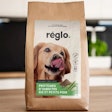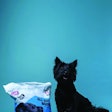
Sustainability and nutrition link insect-based pet food ingredients to human entomophagy, but psychological barriers to acceptance differ. On the health side, insects offer proteins and oils that both pets and people can readily digest. Meanwhile, six-legged livestock tend to need fewer resources to produce those nutrients than animals with four, two or no feet. However, one can’t ignore the Hercules beetle in the room, many people are repulsed by the idea of eating insects. Even in cultures where insects form part of traditional diets, entomophagy rarely carries the prestige of victuals made from vertebrates. Nevertheless, humans may be more willing to accept insects in their pets’ food than their own. Introducing insect-based pet foods has relied on education of pet owners about the sustainability and healthiness of insect-based pet food ingredients. Scientists in Brazil examined the effectiveness of consumer education on pet owners when considering insects as part of their pets’ diets.
“Two distinct groups of pet owners were identified: the Flexible and Inflexible groups,” the researchers wrote in the journal Food Quality and Preference. “The Inflexible group exhibited a significantly higher association with negative emotions, such as disgust, worry, guilt, and anxiety, than the Flexible group. However, after reading an informative text describing the advantages of edible insects, the Inflexible group considered flavor and sustainability as reasons to include insects in their pets' diets, while their concern related to health risk as a reason to exclude insects was significantly reduced. Furthermore, both groups identified capsule, powder/flour and sachet/snack as their most preferred methods to incorporate insects into their pets' diet. The findings from this study provide valuable insights for the animal feed sector by highlighting the openness of pet owners toward edible insects, the preferred forms of administration, and the impact of relevant information on perception.”
Attitudes towards insects in Brazil and other countries
The study involved a survey of 383 participants using a standardized questionnaire that had been used in previous studies globally. Compared to these studies, the average observations related to statements of disgust from the Inflexible group in Brazil were higher than those observed in previous studies in Denmark, Italy, Chile and China.
The growing interest in both insect-based pet food and human entomophagy stems from the environmental and nutritional benefits that insects offer, but effective consumer education may be necessary to expand the market.












